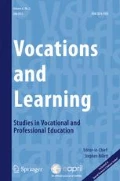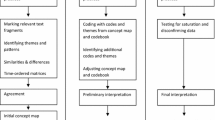Abstract
Learning from errors is an important way of learning at work. In this article, we analyse conditions under which elder care nurses use errors as a starting point for the engagement in social learning activities (ESLA) in the form of joint reflection with colleagues on potential causes of errors and ways to prevent them in future. The goal of our study was to investigate whether exploratory findings from an earlier study on hospital nurses’ ESLA (Bauer and Mulder Learning in Health and Social Care 6:121–133, 2011) replicate and generalise to the domain of elder care nursing. For this purpose, we surveyed a sample of N = 180 elder care nurses using vignette-based questionnaires. With these data, we tested a mediation model of nurses’ ESLA suggested by the earlier study. We firstly found a statistically significant indirect effect of error strain on ESLA that is completely mediated by the estimation of an error as relevant for learning (β = .16). Secondly, the perception of a safe social team climate at work has a statistically significant indirect effect on ESLA that is completely mediated by nurses’ tendency to cover up errors (β = .31). These results entirely cross-validate the exploratory findings of Bauer and Mulder (Learning in Health and Social Care 6:121–133, 2011) on hospital nurses’ ESLA and show that they generalise to the domain of elder care nursing.

Similar content being viewed by others
Notes
Complete mediation means that there is no direct effect of an independent on a dependent variable, beyond the indirect effect via the mediator; if there is a significant indirect and an additional direct effect of an independent on a dependent variable, then there is evidence of partial mediation (MacKinnon et al. 2007).
There are major differences in the work of employees between in-patient and home care organisations in Germany.
References
Ajzen, I. (1991). The theory of planned behaviour. Organizational Behavior and Human Decision Processes, 50, 179–211.
Arndt, M. (1996). Aus Fehlern lernen [Learning from errors]. Pflege, 9, 12–18.
Bauer, J., & Mulder, R. H. (2007). Modelling learning from errors in daily work. Learning in Health and Social Care, 6, 121–133.
Bauer, J., & Mulder, R. H. (2011). Engagement in learning after errors at work: enabling conditions and types of engagement. Journal of Education and Work. Advance online publication. doi:10.1080/13639080.2011.573776.
Bauer, J., Gartmeier, M., & Harteis, C. (2012). Human fallibility and learning from errors at work. In J. Bauer & C. Harteis (Eds.), Human fallibility: The ambiguity of errors for work and learning (pp. 1–14). Dordrecht: Springer.
Berings, M. G. M. C., Poell, R. F., & Van Veldhoven, M. J. (2010). Antecedents of nurses’ on-the-job learning. In M. J. van Woerkom & R. F. Poell (Eds.), Workplace learning: Concepts, measurement and application (pp. 71–87). London: Routledge.
Billett, S. (2004). Workplace participatory practices. Conceptualising workplaces as learning environments. Journal of Workplace Learning, 16, 312–324.
Boshuizen, H. P. A., Bromme, R., & Gruber, H. (Eds.). (2004). Professional learning: Gaps and transitions on the way from novice to expert. Dordrecht: Kluwer.
Cannon, M., & Edmondson, A. C. (2001). Confronting failure: antecedents and consequences of shared beliefs about failure in organizational work groups. Journal of Organizational Behavior, 22, 161–177.
Cohen, J. (1988). Statistical power analysis for the behavioral sciences. Hillsdale, NJ: LEA.
Collin, K., Paloniemi, S., & Mecklin, J.-P. (2010). Promoting inter-professional teamwork and learning - the case of a surgical operating theatre. Journal of Education and Work, 23(1), 43–63.
Edmondson, A. C. (1996). Learning from mistakes is easier said than done: group and organisational influences on the detection and correction of human error. The Journal of Applied Behavioral Science, 32, 5–28.
Edmondson, A. C. (1999). Psychological safety and learning behaviour in work teams. Administrative Science Quarterly, 44, 350–383.
Edmondson, A. C. (2004). Learning from errors in health care: frequent opportunities, pervasive barriers. Quality and Safety in Health Care, 13(6), 3–9.
Eraut, M., Alderton, J., Cole, G., & Senker, P. (1998). Development of knowledge and skills in employment (Research Report No. 5). Sussex: University of Sussex, Institute of Education.
Frese, M., & Zapf, D. (1994). Action as a core of work psychology: A German approach. In H. C. Triandis, M. D. Dunette, & L. M. Hough (Eds.), Handbook of industrial and organizational psychology (pp. 271–340). Palo Alto: Consulting Psychologists Press.
Gartmeier, M., Bauer, J., Gruber, H., & Heid, H. (2010b). Workplace errors and negative knowledge in elder care nursing. Human Resource Development International, 13(1), 5–25.
Gartmeier, M., Gruber, H., & Heid, H. (2010a). Tracing error–related knowledge in interview data: negative knowledge in elder care nursing. Educational Gerontology, 36, 733–752.
Glendon, I., Clarke, S. G., & Mc Kenna, E. F. (2006). Human safety and risk management. Boca Raton: Taylor & Francis.
Gruber, H. (2001). Acquisition of expertise. In J. J. Smelser & P. B. Baltes (Eds.), International encyclopedia of the social & behavioral sciences (pp. 5145–5150). Oxford: Elsevier.
Harteis, C., Bauer, J., & Gruber, H. (2008). The culture of learning from mistakes: how employees handle mistakes in everyday work. International Journal of Educational Research, 4, 223–231.
Hofmann, D. A., & Frese, M. (2011). Errors in organizations. New York: Taylor & Francis.
Keith, N., & Frese, M. (2005). Self regulation in error management training: emotion, control and metacognition as mediators of performance effects. Journal of Applied Psychology, 90, 677–691.
Kline, R. B. (2010). Principles and practice of structural equation modeling (2nd ed.). New York: Guilford.
Kolb, D. A. (1984). Experiential learning. Englewood Cliffs, NJ: Prentice Hall.
MacKinnon, D. P., Fairchild, A. J., & Fritz, M. S. (2007). Mediation analysis. Annual Review of Psychology, 58, 593–614.
Meurier, C. E. (2000). Understanding the nature of errors in nursing: using a model to analyse critical incident reports of errors which had resulted in an adverse or potentially adverse event. Journal of Advanced Nursing, 32, 202–207.
Meurier, C. E., Vincent, C. A., & Parmar, D. G. (1997). Learning from errors in nursing practice. Journal of Advanced Nursing, 26, 111–119.
Muthén, L. K., & Muthén, B. O. (2012). Mplus user’s guide (6th ed.). Los Angeles, CA: Muthén & Muthén.
Oser, F., & Spychiger, M. (2005). Lernen ist schmerzhaft [Learning is painful]. Weinheim: Beltz.
Pfeiffer, Y., & Wehner, T. (2012). Incident reporting systems in hospitals: How does learning occur using this organisational instrument? In J. Bauer & C. Harteis (Eds.), Human fallibility: The ambiguity of errors for work and learning (pp. 255–266). Dordrecht: Springer.
Putz, D., Schilling, J., & Kluge, A. (2012). Measuring organizational climate for learning from errors at work. In J. Bauer & C. Harteis (Eds.), Human fallibility: The ambiguity of errors for work and learning (pp. 107–123). Dordrecht: Springer.
Rasmussen, J. (1987). Cognitive control and human error mechanisms. In J. Rasmussen, K. Duncan, & J. Leplat (Eds.), New technology and human error (pp. 53–60). Chichester: Wiley.
Rausch, A. (2011). Errors, emotions, and learning in the workplace. In E. Wuttke & J. Seifried (Eds.), Learning from errors at school and at work (pp. 111–126). Opladen: Barbara Budrich.
Reason, J. T. (1990). Human error. Cambridge: Cambridge University Press.
Reason, J. T. (1995). Understanding adverse events: human factors. Quality in Health Care, 4, 80–89.
Robinson, D. H., & Levin, J. R. (1997). Reflections on statistical and substantive significance, with a slice of replication. Educational Researcher, 26, 21–26.
Rost, J. (2004). Lehrbuch Testtheorie - Testkonstruktion [Test theory and test construction]. Bern: Huber.
Rybowiak, V., Garst, H., Frese, M., & Batinic, B. (1999). Error Orientation Questionnaire (EOQ): reliability, validity, and different language equivalence. Journal of Organizational Behavior, 20, 527–547.
Senders, J. W., & Moray, N. P. (1991). Human error. Cause, prediction, and reduction. Hillsdale: LEA.
Shavelson, R. J., & Towne, L. (2002). Scientific research in education. Washington D.C.: National Academy Press.
Tjosvold, D., Yu, Z.-Y., & Hui, C. (2004). Team learning from mistakes: the contribution of cooperative goals and problem solving. Journal of Management Studies, 41, 1223–1245.
Tucker, A., & Edmondson, A. C. (2003). Why hospitals don’t learn from failures: organizational and psychological dynamics that inhibit system change. California Management Review, 45, 55–72.
Tynjälä, P. (2008). Perspectives into learning at the workplace. Educational Research Review, 3(1), 130–154.
Van Dyck, C., Frese, M., Baer, M., & Sonnentag, S. (2005). Organizational error management culture and its impact on performance: a two-study replication. Journal of Applied Psychology, 90, 1228–1240.
Wuttke, E., & Seifried, J. (2011). Learning from errors at school and at work. Opladen: Barbara Budrich.
Zhao, B. (2011). Learning from errors: the role of context, emotion, and personality. Journal of Organizational Behavior, 32, 435–463.
Zhao, B., & Olivera, F. (2006). Error reporting in organizations. Academy of Management Review, 31(4), 1012–1030.
Author information
Authors and Affiliations
Corresponding author
Rights and permissions
About this article
Cite this article
Leicher, V., Mulder, R.H. & Bauer, J. Learning from Errors at Work: A Replication Study in Elder Care Nursing. Vocations and Learning 6, 207–220 (2013). https://doi.org/10.1007/s12186-012-9090-0
Received:
Accepted:
Published:
Issue Date:
DOI: https://doi.org/10.1007/s12186-012-9090-0




